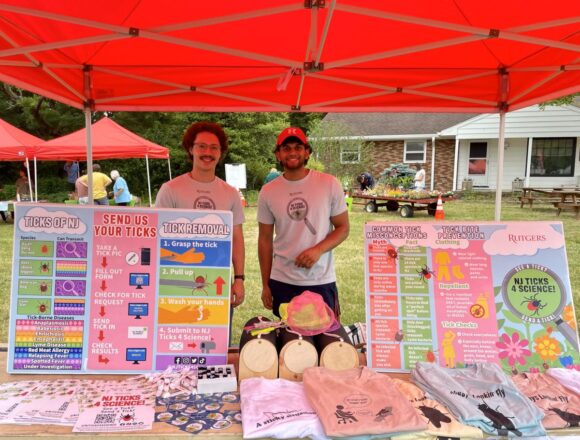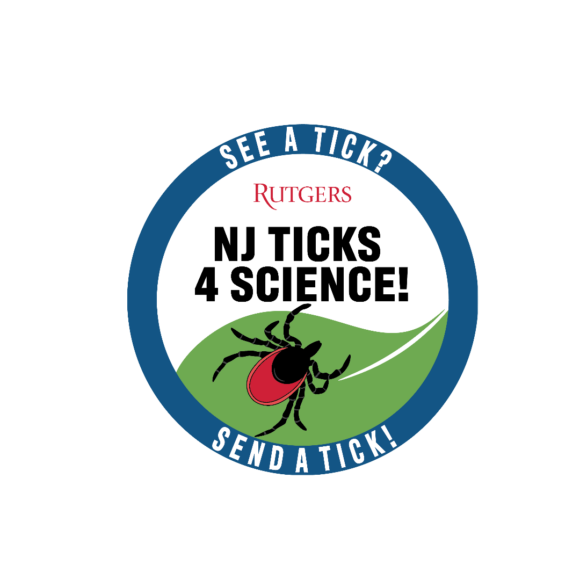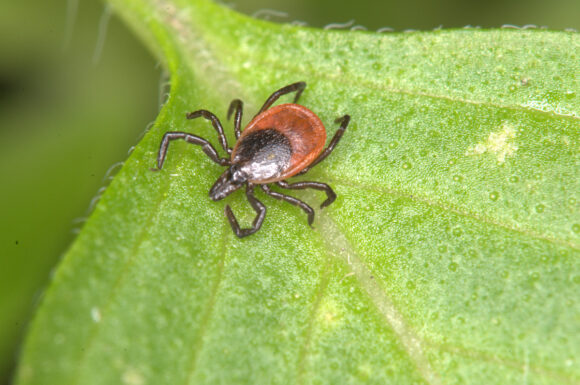
NJ Ticks for Science Booth with Sean Leonard and Siddartha Suppiah.
“New Jersey Ticks 4 Science!” is a citizen-led initiative aiming to create a tick map showing the distribution of tick species and tick-borne pathogens across New Jersey by zip code. Ticks encountered by those working, living, or traveling in the state will be identified from pictures submitted to the NJ Ticks 4 Science website. Ticks mailed-in will be tested for important tick-borne pathogens.
“A map showing tick species occurrence and pathogen status, including new species, will be a resource to scientists and healthcare professionals developing solutions for the enormous burden that ticks currently exert on public health” stated project coordinator Emily Fontaine.
Starting this year, NJ Ticks 4 Science will disclose pathogen testing results back to the submitters. Pathogen testing will differ depending on the tick species. For example, only blacklegged ticks transmit Lyme disease bacteria and Powassan virus; lone star ticks may carry one of two Ehrlichia bacteria.
 To submit a tick, visit the NJ Ticks 4 Science website and complete the tick form accessible through the “send us your ticks” button on the homepage. The form asks for details about where and when the tick was found and prompts submitters to attach clear pictures of their tick. Submitters receive a unique identification (ID) number, allowing them to receive information about their tick’s species and pathogen status.
To submit a tick, visit the NJ Ticks 4 Science website and complete the tick form accessible through the “send us your ticks” button on the homepage. The form asks for details about where and when the tick was found and prompts submitters to attach clear pictures of their tick. Submitters receive a unique identification (ID) number, allowing them to receive information about their tick’s species and pathogen status.
Within 48 hours or less, NJ Ticks 4 Science’s tick experts will review the submitted pictures. In most cases just a picture submission will inform a submitter about their tick species, life stage, sex (if adults), and blood engorgement status, which is linked to transmission risk.
After completing a form, submitters will be told where to mail their physical specimen. It is advised to place the tick in a plastic baggie labeled with the unique ID number or tape the tick to a piece of paper with the ID number. Place the saved tick in an envelope and use the address provided. Please refrain from including personal information as the survey is anonymous but the ID number is essential to connect the online entry with the mailed specimen.

Female blacklegged tick (sometimes called “deer tick”). Photo credit Jim Occi.
It currently takes a few weeks to receive the pathogen testing results. As the service is free and requires the use of expensive materials, testing many ticks simultaneously is most cost-effective. Therefore, the more ticks that are submitted the faster pathogen testing results will be released. Help NJ Ticks 4 Science speed up the process by sending in your ticks and spreading the word about their program!
Over the past year, the NJ Ticks 4 Science team has developed new educational tick materials and conducts regular outreach events. Look for their booth at Rutgers Cook’s Market on most Fridays. They are also partnering with NJAES Extension offices and the Master Gardeners to have a presence in county fairs. Feel free to approach them with any tick-related inquiries and pick up some of their “swag,” including free tick removers, tick cards, educational brochures, flyers, and stickers.
For more information, please visit https://ticks.rutgers.edu

